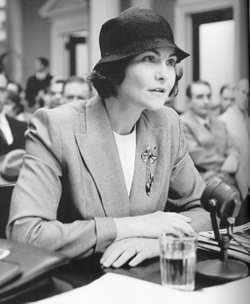

House Committee on Un-American Activities (HUAC or HCUA) (1938–1975) was an investigative committee of the United States House of Representatives. It is often referred to as the House Un-American Activities Committee. In 1969, the House changed the committee's name to the Committee on Internal Security. When the House abolished the committee in 1975, its functions were transferred to the House Judiciary Committee.
The committee's anti-communist investigations are often confused with those of Senator Joseph McCarthy. McCarthy, as a senator, had no direct involvement with this House committee.
McCormack-Dickstein (1934)
The House Committee on Un-American Activities grew from a special investigating committee established in May 1938, chaired by Martin Dies and co-chaired by Samuel Dickstein, himself named in Soviet NKVD documents as a Soviet agent. In pre-war years and during World War II, it was known as the Dies Committee. Its work was supposed to be aimed mostly at German American involvement in Nazi and Ku Klux Klan activity. As to investigations into the activities of the "Klan," the Committee actually did little. When HUAC's chief counsel Ernest Adamson announced that "The committee has decided that it lacks sufficient data on which to base a probe," committee member John E. Rankin added: "After all, the KKK is an old American institution." Instead of the Klan, HUAC concentrated on investigating the possibility that the American Communist Party had infiltrated the Works Progress Administration, including the Federal Theatre Project.
The Dies Committee also carried out a brief investigation into the wartime internment of Japanese Americans living on the West Coast. The investigation primarily concerned security at the camps, youth gangs allegedly operating in the camps, food supply questions, and releases of internees. With the exception of Rep. Herman Eberharter, the members of the committee seemed to support internment.
In 1938, Hallie Flanagan, the head of the Federal Theatre Project, was subpoenaed to appear before the committee to answer the charge that the project was overrun with communists. Flanagan was called to testify for only a part of one day, while a clerk from the project was called in for two entire days. It was during this investigation that one of the committee members famously asked Flanagan whether the Elizabethan playwright Christopher Marlowe was a member of the Communist Party.
In 1939, the committee investigated leaders of the American Youth Congress, a Comintern affiliate organization.
Dies Committee (1938–1944)
HUAC became a standing (permanent) committee in 1946. Under the mandate of Public Law 601, passed by the 79th Congress, the committee of nine representatives investigated suspected threats of subversion or propaganda that attacked "the form of government guaranteed by our Constitution."
Under this mandate, the committee focused its investigations on real and suspected Communists in positions of actual or supposed influence in American society. The first such investigation looked into allegations of Communists in the Federal Theatre Project in 1938. A significant step for HUAC was its investigation of the charges of espionage brought against Alger Hiss in 1948. This investigation ultimately resulted in Hiss's trial and conviction for perjury, and convinced many of the usefulness of congressional committees for uncovering Communist subversion.
Subversion
 Lefthit
Lefthit